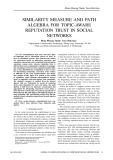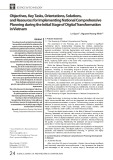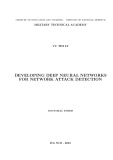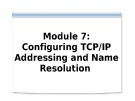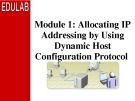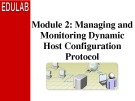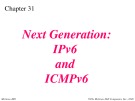
Addressing the Network
-
This paper aims to address this limitation by introducing techniques for estimating trustworthiness from a community context. These techniques rely on similarity measures or operators within the framework of path algebra.
 8p
8p  viengfa
viengfa
 28-10-2024
28-10-2024
 2
2
 2
2
 Download
Download
-
This article discusses the development objectives, key tasks, orientations, and the current state of spatial organization and main content in National Comprehensive Planning, specifically focusing on urban network planning and transportation infrastructure. It also addresses the solutions, resources for implementation, and recommendations for the initial stage of digital transformation in Vietnam.
 7p
7p  vibecca
vibecca
 01-10-2024
01-10-2024
 4
4
 1
1
 Download
Download
-
In this thesis, the limitations of using existing LTE congestion mitigation mechanisms such as Discard Timer and RED have been explored. A different mechanism to analyse the effects of using control theory for congestion mitigation has been developed. Finally, congestion mitigation in LTE networks has been addresses using radio resource allocation techniques with non-cooperative game theory being an underlying mathematical framework.
 118p
118p  runthenight04
runthenight04
 02-02-2023
02-02-2023
 3
3
 2
2
 Download
Download
-
Following the premises of addressing significant issues identified above, the purpose of this research is accordingly raised. The overall objective of this research is to offer an in-depth, rich in context empirical insight in understanding the role of GONGO’s networked governance on CSR in China. This overarching objective will be achieved by two separate aims specifically.
 326p
326p  runthenight04
runthenight04
 02-02-2023
02-02-2023
 8
8
 2
2
 Download
Download
-
Research Aims: The thesis aims to develop deep neural networks for analyzing security data. These techniques improve the accuracy of machine learning-based models applied in NAD. Therefore, the thesis attempts to address the above challenging problems in NAD using models and techniques in deep neural networks. Specifically, the following problems are studied.
 128p
128p  armyofthedead
armyofthedead
 23-06-2021
23-06-2021
 13
13
 3
3
 Download
Download
-
This paper addresses the problem of ℋ∞ finite-time boundedness for discrete-time neural networks with interval-like time-varying delays. First, a delay-dependent finite-time boundedness criterion under the finite-time ℋ ∞ performance index for the system is given based on constructing a set of adjusted Lyapunov–Krasovskii functionals and using reciprocally convex approach.
 14p
14p  tamynhan6
tamynhan6
 14-09-2020
14-09-2020
 15
15
 1
1
 Download
Download
-
The paper highlights the main features of some Euratom projects, which have been running recently in support to education, training and mobility in the nuclear fields. The described projects address various critical aspects of nuclear knowledge management, aiming at maintaining the wealth of nuclear expertise in Europe in an environment characterised by decreased attractiveness of nuclear careers.
 14p
14p  christabelhuynh
christabelhuynh
 29-05-2020
29-05-2020
 10
10
 1
1
 Download
Download
-
This paper proposes the perceptual organization model to perform the above task. This paper addresses the outdoor scene segmentation and object classification using cluster based perceptual organization. Perceptual organization is the basic capability of the human visual system is to derive relevant grouping and structures from an image without prior knowledge of its contents.
 25p
25p  byphasse043256
byphasse043256
 24-03-2019
24-03-2019
 27
27
 1
1
 Download
Download
-
Chapter 4: Network layer. Introduction, network layer overview, IPv4 address, IPv4 Protocol, network routing, , network layer in an internetwork, network layer at the source, router, and destination, network layer at the source, router, and destination (continued).
 65p
65p  registergmxt
registergmxt
 27-05-2018
27-05-2018
 55
55
 4
4
 Download
Download
-
The purpose of this course is to address the implementation and desktop support needs of customers that are planning to deploy and support Microsoft Windows XP Professional in a variety of stand-alone and network operating system environments. It provides in-depth, hands-on training for Information Technology (IT) professionals responsible for the planning, implementation, management, and support of Windows XP Professional.
 10p
10p  nomoney2
nomoney2
 10-02-2017
10-02-2017
 40
40
 2
2
 Download
Download
-
Module 7: Configuring TCP/IP addressing and name resolution. The following topics are covered in this module: Configuring IP addresses, configuring windows firewall, troubleshooting IP addresses, determining TCP/IP name resolution methods, configuring a DNS client and a WINS client, connecting to a remote host.
 43p
43p  nomoney2
nomoney2
 10-02-2017
10-02-2017
 45
45
 4
4
 Download
Download
-
Module 1: Allocating IP addressing by using dynamic host configuration protocol. This module provides you with the knowledge and skills to allocate IP addressing in a network environment. After completing this module, students will be able to: Describe the role of DHCP in the network infrastructure, add and authorize a DHCP Server service, configure a DHCP scope.
 31p
31p  nomoney2
nomoney2
 10-02-2017
10-02-2017
 51
51
 5
5
 Download
Download
-
Module 2: Managing and monitoring dynamic host configuration protocol. This module provides you with the knowledge and skills to manage the DHCP service to reflect changing client IP addressing needs. It also provides you with the knowledge and skills to monitor DHCP server performance, because the DHCP environment is dynamic.
 24p
24p  nomoney2
nomoney2
 10-02-2017
10-02-2017
 48
48
 4
4
 Download
Download
-
Module 3 - Resolving names. This module provides you with the knowledge and skills to assign computer names to the IP addresses of the source and destination hosts, and then use the computer name to contact the hosts.
 20p
20p  nomoney2
nomoney2
 10-02-2017
10-02-2017
 63
63
 3
3
 Download
Download
-
Module 7: Resolving NetBIOS names by using windows internet name service. This module provides you with the knowledge and skills to use WINS to register NetBIOS names and resolve them to IP addresses.
 30p
30p  nomoney2
nomoney2
 10-02-2017
10-02-2017
 50
50
 4
4
 Download
Download
-
Chapter 8 - Network security topologies. Objectives in this chapter: Explain network perimeter’s importance to an organization’s security policies, identify place and role of the demilitarized zone in the network, explain how network address translation is used to help secure networks, spell out the role of tunneling in network security, describe security features of virtual local area networks.
 40p
40p  nhanmotchut_3
nhanmotchut_3
 20-10-2016
20-10-2016
 67
67
 4
4
 Download
Download
-
Lecture Basic network management presents the following content: Hardware components, software and operating system, ethernet network overview, internet protocol address, LAN terminology and components, LAN architecture, Microsoft visio, service TCP/IP, LAN networking devices, building a local area network, monitoring network, firewall concepts, virus concepts, wan overview, building a wide area network, wireless concepts.
 8p
8p  nhanmotchut_3
nhanmotchut_3
 20-10-2016
20-10-2016
 70
70
 2
2
 Download
Download
-
Upon completion you will be able to: Understand the difference between an internet and an extranet, understand private, hybrid, and virtual private networks, understand how VPN can guarantee privacy, understand the mechanism of NAT.
 14p
14p  tangtuy09
tangtuy09
 26-04-2016
26-04-2016
 74
74
 7
7
 Download
Download
-
In this chapter you will learn: Understand the shortcomings of IPv4; know the IPv6 address format, address types, and abbreviations; be familiar with the IPv6 header format; know the extension header types; know the differences between ICMPv4 and ICMPv6; know the strategies for transitioning from IPv4 to IPv6.
 63p
63p  tangtuy09
tangtuy09
 26-04-2016
26-04-2016
 59
59
 3
3
 Download
Download
-
In this chapter we discuss our first client/server application program, Dynamic Host Configuration Protocol (DHCP). This application is discussed first because it is the first client/server application program that is used after a host is booted. In other words, it serves as a bootstrap when a host is booted and supposed to be connected to the Internet, but the host does not know its IP address.
 11p
11p  tangtuy09
tangtuy09
 26-04-2016
26-04-2016
 75
75
 2
2
 Download
Download
CHỦ ĐỀ BẠN MUỐN TÌM








